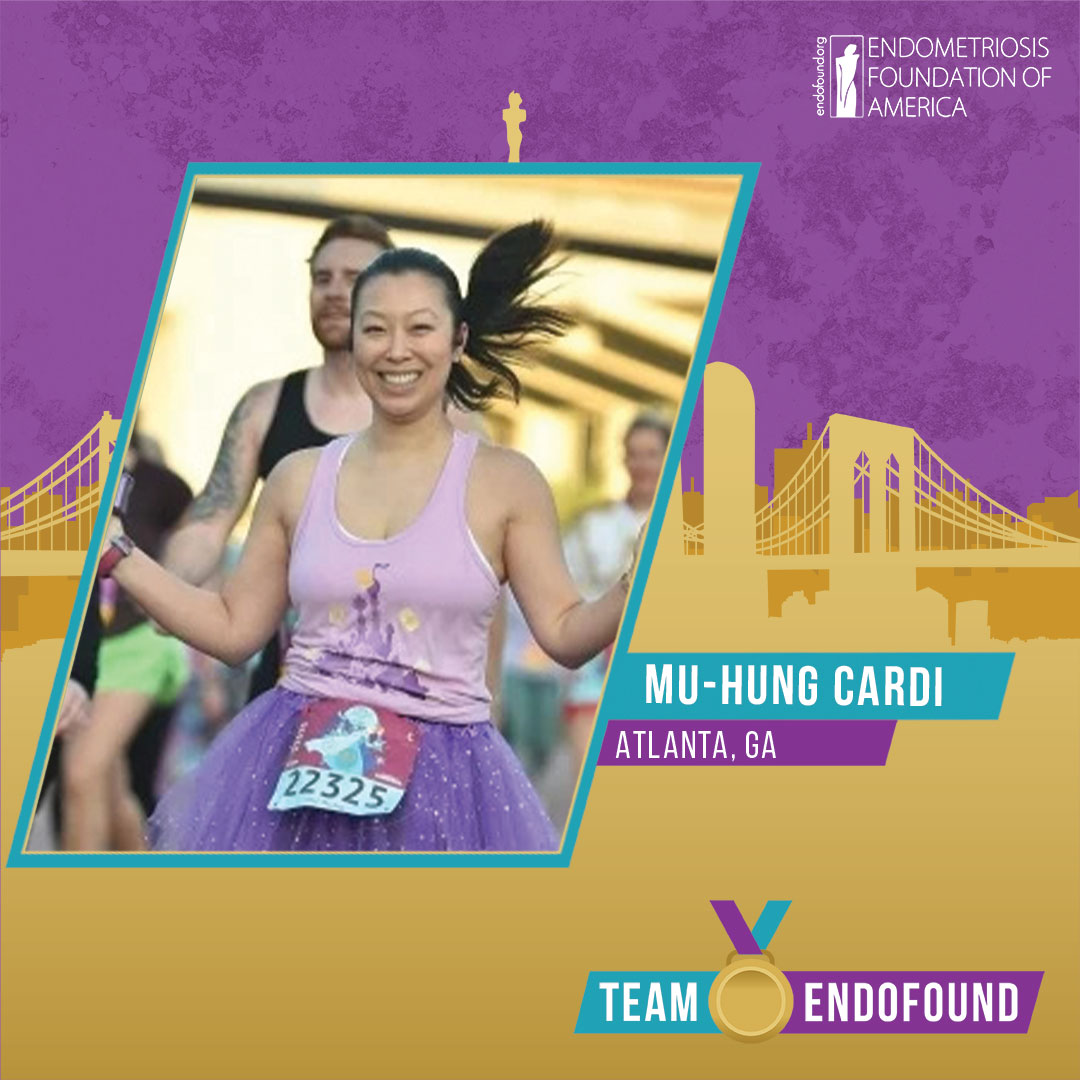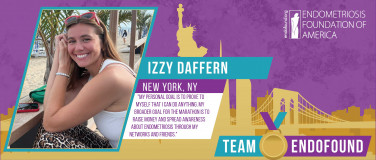
Roughly 25 percent of women with endometriosis have no symptoms. Known as silent endometriosis, it can grow for years without the woman knowing—even to stage IV, as was the case with Mu-Hung Cardi.
The nurse from Atlanta will run in the New York City Marathon on Nov. 3 as one of 50 members of EndoFound’s Team EndoStrong. This is EndoFound’s tenth year as a charity partner with the marathon, and it will be Cardi’s third marathon in 2024, all part of the six World Marathon Majors. She ran the London Marathon in April and the Berlin Marathon on Sept. 29. Her goal is to run all six (including Tokyo, Boston, and Chicago) and, for the New York race, to raise money for endometriosis.
“This is the first one I’ll be running for charity,” Cardi said. “When I looked at charity spots, I applied to three organizations I felt deeply about, and EndoFound was one of them. I was super excited to get a message from Clare [Murphy, EndoStrong’s team organizer] that I was chosen.”

Click Here To Support Mu-Hung Cardi's Marathon Fundraiser
Like many women with endometriosis, Cardi may have had it since her first period. But unlike many who have it, she doesn’t know.
“I never had symptoms that made me think something was wrong,” she said. “I had the usual discomfort during my menstrual cycle, but nothing Advil couldn’t handle.”
Fast-forward to about a decade ago. Cardi was in her early 30s, and she and her husband wanted to have children.
“The reason endometriosis came up was because we tried for a year to have kids and couldn’t,” Cardi said. “We saw a reproductive specialist who did all the tests and scans and said I likely had endometriosis. They said they couldn’t say definitively without doing a laparoscopic procedure to confirm, but they could see endometriomas on my ovaries.”
Cardi had limited knowledge of the disease.
“I was probably around 27 or 28 when I’d gone to one of my annual health appointments, and the gynecologist said, ‘It looks like you have some cysts on your ovaries with fluid in them.’ She called them chocolate cysts and said, ‘I wouldn’t put off having kids much longer.’ But I was in the midst of going to nursing school, and she didn’t give me any more information, so I didn’t think much of it.”
The reproductive specialist who found the endometriomas gave Cardi names of surgeons, and Cardi had excision surgery in January 2015. She said the surgeon said afterward that the endometriosis was in stage IV, far more extensive than expected.
“He removed my left fallopian tube, took out my appendix, and cleaned out a bunch of endometriosis along my bowels,” Cardi said. “He said he had to leave some of it because he didn’t feel comfortable doing too much.”
That was fine with Cardi. She and her surgeon agreed the goal wasn’t necessarily to remove all of the disease.
“When you want children but have infertility, it can be daunting that it might never happen,” Cardi said. “Our goal was to make sure we could get everything in some sort of working condition and keep the reproductive organs I needed so that we could pursue fertility treatments.”
Four months after surgery, Cardi was pregnant and gave birth in 2016 to a healthy son. They accomplished their goal, but it may have come with a cost.
“When you do fertility treatments, you put a lot of hormones into your system, and I wonder how that may have affected the endometriosis left behind after the surgery,” Cardi said. “I wonder because I had two miscarriages after our son was born, and our second son, born in 2019, had to be through IVF.”
Cardi said when they went through the egg retrieval stage of the IVF procedure, doctors said it looked on the ultrasound like they’d be able to retrieve 15 eggs. However, once they completed the procedure, they only got seven because most of what they thought were eggs were cysts.
“I don’t know how bad the endometriosis is now, and I haven’t really thought about another surgery since I don’t have any symptoms that bother me, but I haven’t ruled out the possibility of needing one down the road,” she said. “I have uncomfortable periods, but Advil continues to take care of it. I know how lucky I am in that sense and how fortunate I am to have had our two children.”
One way Cardi is making the most of her good fortune today is by running. Her first marathon was the Walt Disney World Marathon in 2023. She targeted the World Marathon Majors this year “to do something that’s incredibly hard.”
“I’m a very, very, very slow runner. My official London Marathon time was five hours and fifty-five minutes, though I count ten minutes of that waiting for the bathroom,” she said. “I expect I’ll run through the five boroughs at a snail’s pace. New York has a ton of bridges and can be hillier, but I do live and train in Atlanta where we have hills and a lot of humidity, so we’ll see. What I know is I can move for five to six hours, and I’m grateful for that.”
Cardi urges all women suffering from any health issue to advocate for themselves. As a nurse, she sees many who don’t.
“Being in a hospital and taking care of patients, I see how easy it is for people to just do whatever the medical community tells them,” she said. “A lot of it is good advice, but you know yourself best. You live with your body and know what it’s like every day. Don’t discount that, do your research, and don’t be afraid to let your providers know how you feel.”
To contribute to Mu-Hung Cardi’s cause, visit https://give.endofound.org/fundraiser/5536985.









